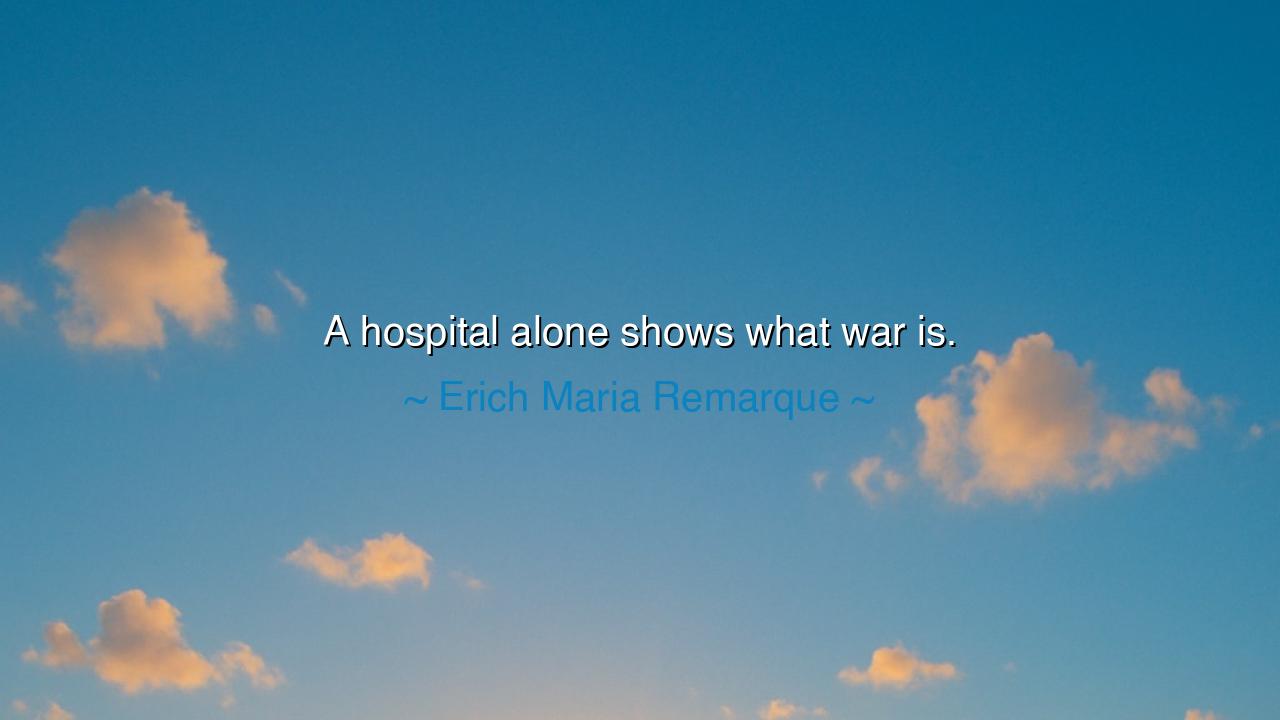
A hospital alone shows what war is.






In the stark and powerful words of Erich Maria Remarque, “A hospital alone shows what war is.” We are confronted with the unspeakable horrors and profound truths that war brings to the human experience. The hospital, often a place of healing and comfort, becomes in this context a symbol of the devastation and suffering that war inflicts upon both the body and the soul. To witness the wounded, the broken, and the dying is to witness the brutality and futility of war in its most raw and unrelenting form. In the sterile, silent corridors of a war hospital, Remarque asks us to confront the consequences of conflict—not just in terms of loss and injury, but in terms of the human spirit that is fractured and often shattered beyond repair.
The ancients, too, understood the deep impact of war on the human soul. Homer, in his epic The Iliad, paints a picture of the destruction and anguish that war brings to all involved. Through the character of Achilles, Homer explores the rage and grief that come with the bloodshed of war, while the death and suffering on the battlefield weigh heavily on the warriors’ hearts. The Greek word for war, “polemos,” is derived from “polemos anthropon,” meaning “destruction of people,” signifying that war is a force that does not merely kill the body, but dismantles the very humanity of those who are caught in its wake. Homer’s words echo across millennia, reminding us that war does not end when the battle is over—it lingers in the wounds that cannot be seen, in the brokenness that persists long after the fighting has ceased.
Erich Maria Remarque’s perspective on war, especially as seen through the hospital, brings us face-to-face with a different kind of horror—the emotional and physical aftermath that war leaves in its wake. In his masterpiece All Quiet on the Western Front, Remarque recounts the harrowing experiences of soldiers in World War I, describing the senselessness of war and the deep scars it leaves on those who endure it. The hospital, with its endless rows of the wounded and dying, becomes an emblem of the suffering and disillusionment that war brings. The soldiers, many of whom have seen their comrades fall, are not only physically scarred but emotionally devastated, unable to reconcile the violence they have witnessed with any form of sense or purpose. Remarque invites us to reflect on the psychological toll of war, a toll that no victory can ever truly erase.
One of the most poignant examples of this can be found in the life of Wilfred Owen, a poet who served during World War I and whose poetry vividly captures the nightmarish realities of war. In his poem Dulce et Decorum Est, Owen describes soldiers stumbling through the battlefield, “coughing like hags,” wounded and gassed in ways that leave them broken beyond recognition. Owen’s depiction of war—like Remarque’s—shows us not the glory of combat, but the horror of the consequences. The hospital is not just a physical space for healing, but a representation of the deep emotional and psychological wounds that are carried long after the battle is over. Just as Owen’s poetry underscores the brutality of war, Remarque’s hospital shows us its aftermath—where the effects of violence linger in the heart, in the mind, and in the body.
The lesson we take from Remarque’s words is clear and powerful: war is a destructive force, not only for the body but for the human spirit. It strips away the dignity, the hope, and the innocence of all who are touched by it. The hospital becomes a grim reminder that, no matter the outcome of the conflict, human lives are destroyed in ways that go far beyond the battlefield. The world is not made safer by war—it is scarred by it. And the soldiers, the families, and the communities left behind bear the consequences long after the guns fall silent. War teaches us, in its harshest form, that no victory can ever truly justify the cost of human life, the suffering of the innocent, and the permanent damage done to the hearts and minds of those who live through it.
In our own lives, we must recognize the impact that conflict—whether internal or external—can have on our hearts and minds. Let us choose to resolve differences not through violence or war, but through understanding, compassion, and dialogue. The hospital in Remarque’s quote teaches us that the true cost of war is felt long after the fighting is over, in the lives of those who must rebuild and heal. Let us strive to be the healers, not the destroyers; the builders of peace, not the perpetuators of violence. In a world that often seems at odds with itself, the true path to healing begins not on the battlefield but in the way we treat each other—in the way we choose to be human, rather than fighting for power.
Let us take action: In our daily lives, let us be mindful of the impact of our words, our actions, and our decisions. Just as the hospital shows the results of war, so too can our actions leave deep scars—either on others or on ourselves. Let us choose compassion over cruelty, peace over conflict, and understanding over division. In doing so, we become part of the healing process, ensuring that the light of humanity can shine through even the darkest of times. Through these choices, we can begin to build a world where the lessons of history—like the wisdom of Remarque’s quote—guide us toward a future of compassion, unity, and peace.






AAdministratorAdministrator
Welcome, honored guests. Please leave a comment, we will respond soon